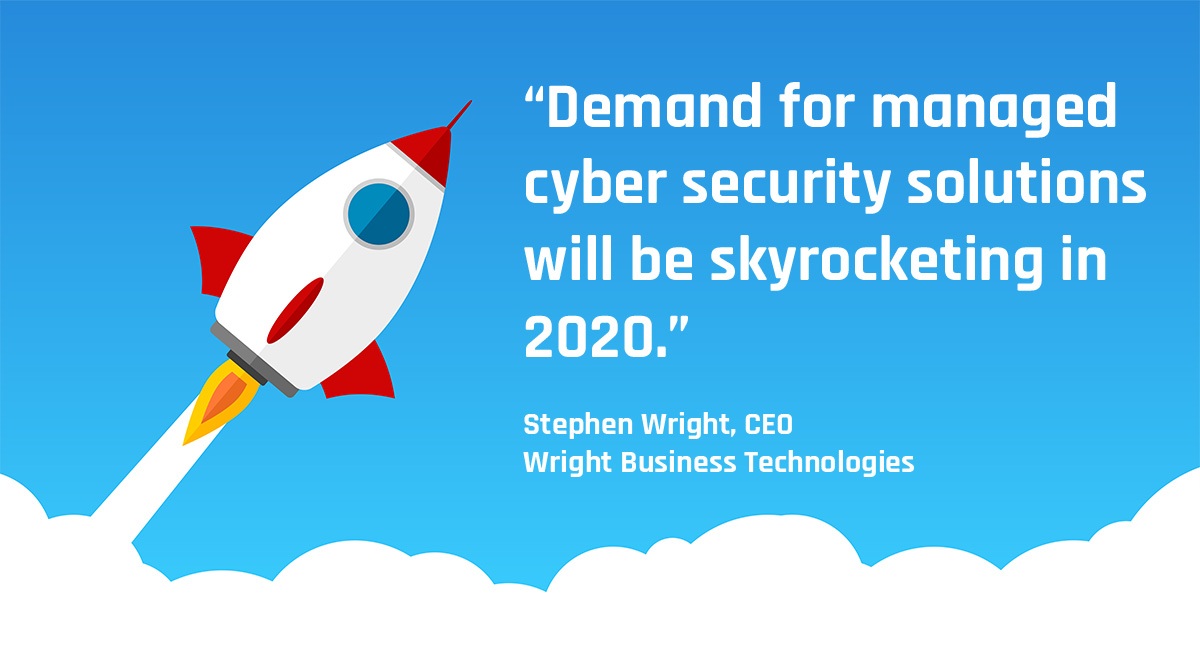5 Predictions in Managed Services
2020 is just around the corner, and while many segments of your business might be winding down for the holidays, the information technology (IT) sector never sleeps.
Technology never sleeps.
As companies everywhere navigate the ever-changing and more complex information technology (IT) landscape, the pressure on efficient operating models has never been more significant.
More and more companies are turning to a third-party managed service provider for their IT needs.
What is a Managed Service Provider?
A third-party Managed Service Provider provides Managed IT services that help businesses better organize, operate, and safeguard their business, and ultimately compete at a high level in the marketplace. You can learn more about Managed Services here.

Following are 5 predictions about how Managed Services will continue to evolve and grow in 2020 and how these predictions will impact your business.
5 Predictions for Managed Services in 2020
1. There will be a cyber security spending spree.

The cyber security industry is expected to grow by an incredible 15% over 2020. That should come as no surprise to anyone running a business today as cybercrime, hacking, and other forms of cyber risks have soared. Unfortunately, 2020 will be no exception and will only prove that cyber security will continue to be a dominant IT concern for any business.
As a result, we expect demand for managed cybersecurity solutions skyrocketing in 2020.
Cybercriminals have become so sophisticated in recent years that the average business owner, executive, or even CIO cannot guarantee an acceptable degree of security. Just look at the news. It seems like almost every week, another Fortune 500 company has had their sensitive data breached, proprietary information stolen, or their social media accounts hacked. Even the government is not immune.

The problem is that many companies are not prepared and do not understand the potent but invisible threats that cybercrimes pose. Besides having their data stolen or losing the trust of their customers, companies that don’t comply with cybersecurity standards might also face fines and litigation.
The cyber security arms race is expected to continue unabated in 2020. In early 2019, for the first time in history, online sales of merchandise overtook general merchandise sales, which includes department store sales. Even outside of retail, it is crystal clear that business and sales transactions are increasingly occurring outside of traditional venues. Instead, business is migrating to the cloud or taking place through the world wide web. Even point-of-sale hardware found in brick and mortar retail establishments is online. Cyber security will be a hot button in 2020 for sure.
2. We will see Managed Service Providers become more regarded as valued trusted advisors to business owners.

Managed Service Providers (MSP) are increasingly moving beyond mere providers of IT goods and services. While MSPs still make their bread and butter from providing managed IT solutions, they are also increasingly filling the trusted advisor and consultant for their customers.
Experienced and Knowledgeable Managed Service Provider
The core business of most companies has little to nothing to do with the IT industry. As a result, there is a high demand for IT consultants who know how to build, manage, and maintain complex IT processes and systems necessary to compete in today’s highly advanced marketplaces. As a result, many companies are turning to an experienced and knowledgeable Managed Service Provider to provide IT solutions and develop and implement business strategies for leveraging technology to grow their bottom line.
IT Strategy Consulting
We believe it is natural for IT Service Providers to continue to expand beyond building and managing IT infrastructure and grow into IT strategy consulting. Areas an MSP consultant (or IT Strategy Consulting) could help your business with include:
- Technology training
- Security compliance
- Cloud integration
- Automated work processes
- Workplace strategy
- And many more!
3. Everything is becoming more remote and in real-time.

Today, a Managed IT Service professional can be summoned via a ping on Messenger. Better yet, with a truly managed IT solution, the IT service itself can actively monitor for issues and deal with them as they crop up. Add a dash of big data and automation, and all of a sudden, problems that once took an in-house IT team days to take care of on-site can now be quickly addressed by an algorithm or remote managed service team without you even knowing.
This is a revolutionary shift for businesses. In the past, many IT functions had to occur onsite and thus required the attention of an onsite IT staff. This was needlessly expensive and difficult to maintain. In some ways, this is still the case today with things such as personal computers and local servers, as they are an important part of many businesses. However, what has changed is how those services are delivered.
Today, applications and services can be pushed from the cloud to virtually any device with an internet connection. Better yet, thanks to high-speed internet connections, and 5G soon to come, real-time processing power and real-time information monitoring are now commonplace.
It’s easier than ever before to outsource many, if not most, of your companies IT functions to a dedicated and knowledgeable third-party Managed Service Provider. In 2020, the emphasis on easier and simpler integration of real-time, remote IT management will continue to surge forward. Automation and cloud integration will only accelerate this trend further.
4. Monthly pricing models for Managed IT Services will become standard.

(hint: At Wright Business Technologies we already provide low fixed monthly pricing!)
Hand in hand with the exceptional flexibility of a Managed IT Services solution is a turn towards pricing with competitive monthly pricing.
In 2020, we expect a significant percentage of businesses that will seek a fixed monthly fee arrangement for Managed IT Services. However, you must still be aware of service tiers, hoops, and hidden fees that will accompany too good to be true pricing.
In the past, companies had to retain and support their own IT departments and staff to manage their in-house IT infrastructure, equipment, software, and workflows. This was costly and inefficient. Companies run by non-IT executives often struggled to hire the right talent, purchase the right equipment, and manage their IT resources efficiently.
More often than not, companies often overlooked IT and other technical support staff, viewing them as akin to mechanics or metaphorical firefighters who react to issues and put out fires as they pop up. As a result, many IT teams were either perennially underfunded.
In other words, scalability was a significant problem.
After all, it is challenging to craft a perfect IT budget that will take into account every possible IT concern for an entire year. Therefore companies made their best guess when it came to budgeting and hoped they had invested enough in their IT to squeak by another year.
This is no longer the case today. Thanks to the advent of cloud computing, real-time feedback, and anywhere connectivity via the internet, the old barriers to an outsourced or managed service solution are all but gone.
Companies no longer have to manage their own IT infrastructure, equipment, software, or workflows. It has all migrated into the cloud. As a result, everything can be managed from the cloud. Better yet, everything is eminently scalable and can be measured.
This new trend is good news for businesses seeking managed services on a tight budget.
5. More businesses will turn to Managed IT Services.

Finally, the role of IT has dramatically expanded beyond the scope of making sure your computers and servers work. IT is now responsible for strategy and planning.
Try to imagine your business running without access to the internet. You might as well ask your employees to go back to handwriting on paper and snail mailing deliverables to customers. No company like that could survive for long in today’s tech-driven environment.
The truth is that the IT infrastructure and expertise necessary to run a successful business operation is far beyond a simple internet connection. IT is playing an increasingly important and sophisticated role in the decision-making process and planning.
IT now touches many aspects of a business from HR, risk management, supply chain, customer service, sales, and even the daily work routines of employees and executives. Such complexity and operational sophistication can only be handled efficiently through a third-party Managed Service Provider. Consider MSPs as a strategic partner that your company can leverage for talent, specialists, multifaceted technological solutions, business processes, and expertise to run all or part of your IT functions.
2020 will be the year businesses will begin adopting managed services as a strategic competitive advantage over their competitors.
What about your business?
Does your business have a competitive advantage in 2020?
Wright Business Technologies, which serves businesses in the greater Houston area, can help you gain a competitive advantage. Find out now by getting a Managed Services estimate. Just click the button below.

